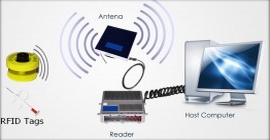1) What is Radio-frequency identification (RFID) ?
- RFID is an abbreviation of Radio Frequency Identification.
- RFID is an AIDC (Automatic Identification and Data Capture) Technology that uses radio-frequency waves to transfer data between a reader and an electronic(RFID)tag attached to an object,for the purpose of identification and tracking.
- RFID is Fast, Reliable, and doesnot require Physical Sight or Contact between reader/scanner and the tagged item(RFIDTag).
- RFID is widely used for Identification of men, material, vehicles, animals, products, baggage and books.
- ID"Tags" that can:
- Store unique ID information
- Read and write data to the tag
- Maintain historical information
- An automatic way to collect information or data on:
- Products
- Places
- Times
- Transactions
- RFID Tag
- A memory device, usually eeprom,programmed with a series of bits/bytes.
- Reader/Writer(Interrogator)
- The unit powers the coil of wire known as the antenna, filters and powers them for transmission over distance.
- Antenna
- This is a coil of wound copper wire designed specifically to emit RFID signal.
- Host computer/Interface/Software
- The unit interfaces the reader to an intelligent device.
2)How It Works ?
- Tag enters RF Field
- RF signal powers tag
- Tag transmits ID,plus data
- Reader capture data
- Reader send data to computer
- Computer determines action
3)What are The unique features of RFID ?
1. Possibility of having a unique ID (unique in the world!)
- No duplication, no copy
- Applications: counterfeiting, security, sensitive data, guaranty
2. On the fly reading
- No line of sight
- Applications: reading on conveyors, access control (ski pass), ticketing, animal tracking
3. High speed data capture
- Time to read the ID: about 10 ms
- Applications: inventory, asset tracking, access control, process automation
4. Simultaneous multi-tag reading
- Ability to read about 10 to 50 tags per second
- Application: Supply chain, apparel, library, fast inventory
5. Writing capability
- Ability to store information into the tag memory, with read / write password protection modes
- Applications: Maintenance, loan management, biometry, asset management, delivery tour, money transaction
6. Durability of the ID
- The lifetime of the tag depends only on the packaging quality
- The packaging be very light: disposable tag, or highly rugged
- Applications: Marking of critical components (wagon wheels), maintenance
|
Our Solutions |
|
 |
|
|
|
Our Services |
|
 |
|
|
|
Request for a Quote |
|
 |
|
|
|
|